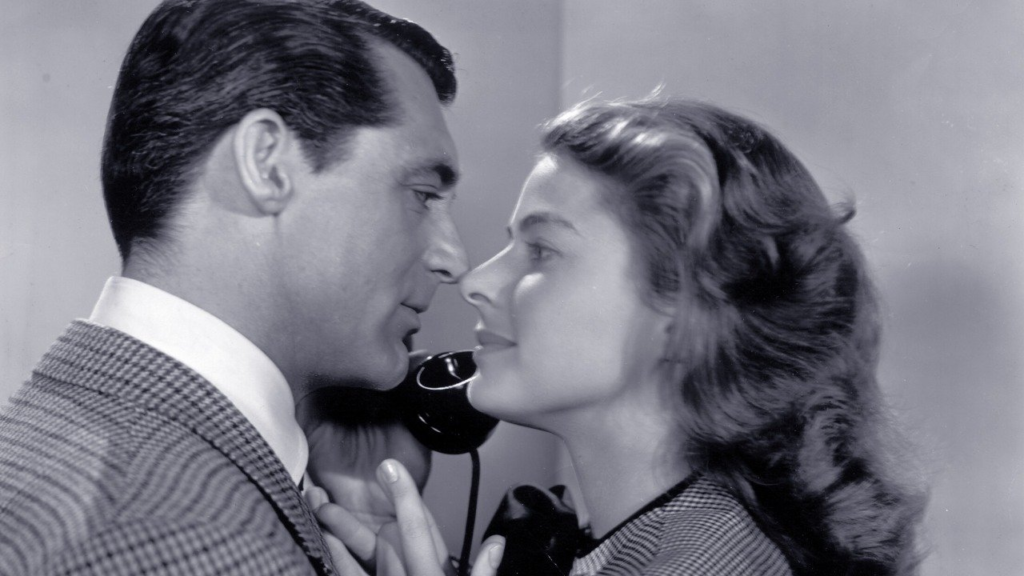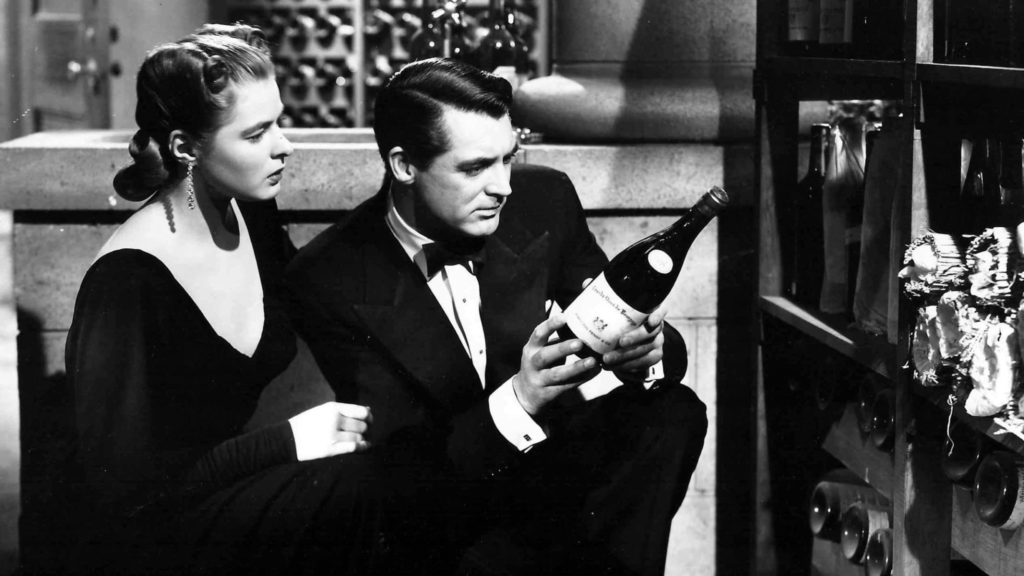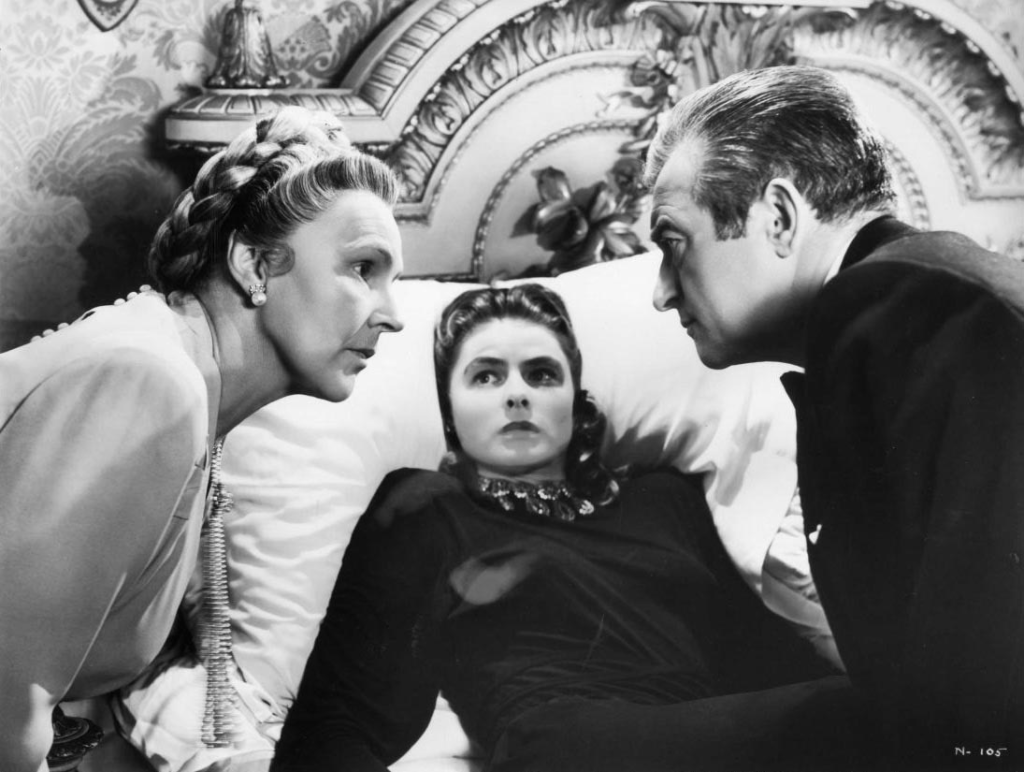| Chris Polley |

Notorious plays at the Heights Cinema on Thursday, March 30. Visit trylon.org for tickets and more information.
“Every man that looks at you is a menace,” says runaway Nazi Alexander Sebastian (played by Claude Rains), the third wheel to and ultimate mark of the American power couple (played by Cary Grant and Ingrid Bergman) at the center of Alfred Hitchcock’s alternately claustrophobic and careening spy thriller Notorious (1946). Jealousy burns bright within nearly every male character in the film, as well as at least one of the women. On top of this already animalistic emotion, Hitchcock and screenwriter Ben Hecht, known as the “Shakespeare of Hollywood” by many during Los Angeles’s golden era, boldly set their film in the present day, just after World War II came to a halt, when patriotism and vengeance were often conflated, not unlike love and envy.
Upon the film’s release, the Allied powers were still in the midst of a drunken moment of victory—drunk in that there was a sense of excessive, often mindless celebration in the air, but also drunk with dark shades of trauma survival and an unsettled understanding of what to do or where to go next. Notorious overtly picks up on these sentiments. “There is a constant feeling of intoxication about the film; bottles of wine figure significantly in several episodes, and during the course of the story Miss Bergman is often seen drinking (though she progresses from alcohol to poison),” Janet Maslin writes for The New York Times, recalling an observation made in a classic interview between Hitchcock and French auteur François Truffaut.1 Nearly every corner of the planet had just experienced magnanimous horrors, from the Holocaust to Hiroshima and beyond, and Notorious finds its protagonists broken and blind, yet also enthralled with each other and ensconced in each other’s arms.
Bergman plays Alicia Huberman, a strong-willed woman with a secret that Grant’s T.R. Devlin knows—her father is a Hitler apologist. Devlin also knows that Alicia doesn’t share her father’s views and, essentially, guilt trips her into helping him bring down a circle of fugitive fascists (including Rains’s Sebastian) that have fled to Brazil in the wake of the war’s end. Already, their bond is wrapped up in emotional bribery, but of course, there’s something about going on assignment together to bring down evil that gets two attractive heroes’ motors running, if you catch my meaning. But it’s the master of suspense, not romance, at the helm, so naturally, just as in his other lust-tinged thrillers (Vertigo, Suspicion, Rebecca), there’s something sinister lurking underneath the crackling chemistry between the leads, including when they’re actively engaged in Hays Code-skirting canoodling.
“Bergman and Grant told Hitchcock that they felt very awkward doing the kissing scene because Hitchcock wanted them boxed in together and unable to let go of each other,” writes Dan Callahan in his 2020 book The Camera Lies: Acting for Hitchcock. “It didn’t feel natural to them. But an unnatural show for a camera that usually lies visually expresses in Hitchcock the truth about people and situations.”2 And then, of course, there Hitch’s more characteristic and freewheeling camera exercises, from an axis-spinning Dutch tilt framing Devlin as a malicious mystery in the midst of Alicia’s hangover early in the film to the more iconic sweeping crane-to-macro shot of a clandestine key in Alicia’s hand later on. No matter if staging a smooch or a set piece, the filmmaker maintains a stranglehold on conveying acute sickness onscreen in a multitude of ways.

And it’s not just the characters that become pawns in Hitchcock’s assured and ostentatious display of mastery—the Brit is unafraid to put the entirety of the American psyche in his sights too. Alicia and Devlin aren’t just head over heels for each other, as they’re also head over heels with the notion of American supremacy, which is ultimately what brings them together, personal family baggage and bald-faced manipulation notwithstanding. Furthermore, their zeal for justice just makes their situationship all the more complicated and tenuous. “What also makes this film exceptional is the filmmaker’s audacity to toy with the theme of patriotism, portraying the American government as a morally extremely flexible, opportunistic heap of unscrupulous officials,” writes Sven Mikulec for Cinephilia & Beyond.3 No one is a hero in Notorious despite the moral binary presented by Nazism, and everyone is riddled with ignoble thoughts and unclear perceptions.

Hitchcock doesn’t leave everything on the more sympathetic side of things wrapped up in a morass of moral grayness, though. In fact, unlike so much of his output that has been reassessed through a feminist lens—not to mention the countless behind-the-scenes anecdotes of emotional manipulation and borderline abuse attested to by actresses, most notably Tippi Hedren on the set of The Birds—many wonder whether Bergman’s Alicia is the director’s only successful attempt at portraying misogyny onscreen without playing into it, and also arguably depicting true female empowerment.
“Hitchcock’s obsessions repeated a frequent need to place the lead female, usually a blonde, virginal but certainly sexually attractive, in precarious situations, demanding that she be rescued by a heroic male. This male character is often an ordinary or ‘Wrong Man’ thrown into an impossible set of circumstances,” writes Brian Eggert for Deep Focus Review. “And yet, in Notorious, few of those all-too-frequent Hitchcockian stereotypes exist. Rather than a blonde ideal present merely to be rescued, Ingrid Bergman is a brunette, sexually experienced, even a drunk.”4 The intimate and intimidating portrayal by Bergman adds to Hecht’s incisive dialogue for Alicia and, yes, Hitch’s own formidable framing of his lead (decked out, per usual, in utterly stunning and dynamic Edith Head costumes, compared to the drab suits and tuxedos worn by the men).
“Today Notorious reads as an indictment of the terrible things women are forced to do and then judged for, rather than a moral tale of punishment for ‘unfeminine’ behaviour,” writes Lauren Carroll Harris for Senses of Cinema.5 Though Alicia, like Sebastian and the Allied forces at large, remains in a stupor at the film’s conclusion, she is emblematic of the film’s powerful resonance that still rings loudly today: when the war is over and the plumes of smoke on the battlefields finally start to dissipate, there is still work to do—and the winners have their own messes to clean up too.
NOTES
1 Janet Maslin, “Ingrid Bergman and the Enduring Appeal of ‘Notorious’,” The New York Times, October 26, 1980 (https://www.nytimes.com/1980/10/26/archives/ingrid-bergman-and-the-enduring-appeal-of-notorious.html).
2 Dan Callahan, The Camera Lies: Acting for Hitchcock, (Oxford: Oxford University Press, 2020), 121.
3 Sven Mikulec, “‘Notorious’: Hitchcock’s Mature and Intricate Espionage Masterpiece,” Cinephilia & Beyond, March 19, 2023.
4 Brian Eggert, “The Definitives: Notorious,” Deep Focus Review, November 14, 2007.
5 Lauren Carroll Harris, “‘The ragged end of nowhere’: Alfred Hitchcock’s Notorious (1946),” Senses of Cinema, June 2015.
Edited by Olga Tchepikova-Treon
